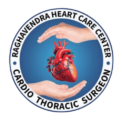Hypertrophic Obstructive Cardiomyopathy
Appointment Form

Dr. Raghavendra Murthy
MBBS, MS - General Surgery, MCh - Cardio Thoracic and Vascular Surgeron

Hypertrophic Obstructive Cardiomyopathy Treatment in Bangalore
Hypertrophic Obstructive Cardiomyopathy is a heart condition characterized by the thickening of the heart muscle, particularly affecting the heart wall and septum. This condition leads to obstructive cardiomyopathy, which can restrict blood flow and affect overall heart function. Effective Hypertrophic Obstructive Cardiomyopathy treatment in Bangalore, especially under the care of Dr. Raghavendra Murthy, is essential for managing symptoms and improving the quality of life for patients. Medical facilities in Bangalore provide advanced diagnostic and treatment options for hypertrophic cardiomyopathy, helping patients find relief from symptoms and preventing further complications.
For those experiencing hypertrophic cardiomyopathy symptoms, seeking prompt treatment from Dr. Raghavendra Murthy is vital. The Hypertrophic Obstructive Cardiomyopathy treatment in Bangalore includes a range of options, from medication to surgical interventions. Understanding the nuances of this condition is crucial for patients and their families. By addressing the thick heart muscle and the underlying causes, specialists like Dr. Raghavendra Murthy can help patients manage their condition effectively. The prognosis for those receiving timely and appropriate care is generally positive, making it important to explore treatment options available in Bangalore.
What is Hypertrophic Obstructive Cardiomyopathy?
Hypertrophic Obstructive Cardiomyopathy is a genetic condition that causes the thickening of the heart muscle, particularly affecting the left ventricle. This thickening can obstruct blood flow, leading to various symptoms and complications. Hypertrophic cardiomyopathy is often diagnosed through medical imaging and physical examinations, highlighting the need for awareness of hypertrophic cardiomyopathy symptoms such as chest pain, shortness of breath, and palpitations. Understanding the condition is essential for effective hypertrophic obstructive cardiomyopathy treatment.
Symptoms of Hypertrophic Obstructive Cardiomyopathy
Common hypertrophic cardiomyopathy symptoms include:
- Shortness of breath during exercise: Patients often experience difficulty breathing, especially during physical exertion, which can significantly impact their daily activities.
- Chest pain, especially during physical activity: This discomfort can range from mild to severe and may indicate underlying heart issues.
- Dizziness or fainting: These symptoms may occur due to inadequate blood flow to the brain, particularly during strenuous activities.
- Palpitations or irregular heartbeats: Patients might feel their heart racing or skipping beats, which can be alarming and warrant medical attention.
- Hoarseness: Pressure on the vocal cords can lead to voice changes.
Recognizing these symptoms early is crucial for effective Hypertrophic Obstructive Cardiomyopathy Treatment in Bangalore. Timely intervention can lead to better management of the condition and improved patient outcomes.
Causes of Hypertrophic Obstructive Cardiomyopathy
- Genetic mutations: The primary cause of hypertrophic obstructive cardiomyopathy is genetic mutations affecting heart muscle proteins, which result in the thickening of the heart wall.
- Obstructive issues: These genetic changes lead to obstructive cardiomyopathy, impairing overall heart function and blood flow.
- High blood pressure: Chronic high blood pressure can exacerbate the thickening of the heart muscle, increasing the risk of complications.
- Health conditions: Certain health conditions, including metabolic disorders, may also contribute to the development of hypertrophic cardiomyopathy.
- Understanding underlying causes: Recognizing these causes is crucial for both patients and healthcare providers to implement effective treatment strategies for managing hypertrophic obstructive cardiomyopathy.
By addressing these key factors, healthcare professionals can provide better treatment plans for hypertrophic obstructive cardiomyopathy. This approach allows for more effective management of symptoms and improves overall patient outcomes. Understanding the condition’s causes is essential for developing personalized strategies that enhance the quality of life for patients, particularly when considering hypertrophic obstructive cardiomyopathy treatment in Bangalore.
Risk Factors of Hypertrophic Obstructive Cardiomyopathy
Risk factors include:
- Family history of hypertrophic cardiomyopathy: A genetic predisposition increases the likelihood of developing this condition, highlighting the importance of family medical history.
- Genetic predisposition: Specific mutations can be inherited, affecting heart muscle function and structure.
- High blood pressure: This condition can exacerbate symptoms and lead to further complications, such as congestive heart failure.
- Age and gender: Men are generally at a higher risk, and symptoms often present in adolescence or early adulthood.
Understanding these risk factors can help individuals make informed decisions about monitoring and seeking Hypertrophic Obstructive Cardiomyopathy treatment in Bangalore. Engaging in regular check-ups and discussing any concerns with healthcare providers can facilitate early diagnosis and effective management of this serious heart condition.
Complications of Hypertrophic Obstructive Cardiomyopathy
Potential complications associated with hypertrophic obstructive cardiomyopathy can significantly impact patient health, including:
- Heart failure: The thickening of the heart muscle can lead to inefficient pumping of blood, potentially resulting in heart failure.
- Irregular heartbeats (arrhythmias): Changes in heart structure may cause electrical disturbances, leading to arrhythmias that can be dangerous if left untreated.
- Sudden cardiac arrest: This life-threatening condition can occur in severe cases of hypertrophic obstructive cardiomyopathy, particularly during intense physical activity.
Monitoring and early intervention are crucial for reducing risks associated with hypertrophic obstructive cardiomyopathy. Regular check-ups and symptom awareness help manage complications effectively. Access to hypertrophic obstructive cardiomyopathy treatment in Bangalore further improves outcomes and quality of life for patients.
Preventions of Hypertrophic Obstructive Cardiomyopathy
Preventive measures are essential for individuals at risk of hypertrophic obstructive cardiomyopathy. These measures include:
- Regular check-ups: Individuals with a family history of hypertrophic cardiomyopathy should schedule routine evaluations to monitor heart health.
- Maintaining a healthy lifestyle: A balanced diet and regular exercise can help manage weight and overall heart health.
- Monitoring blood pressure and cholesterol levels: Keeping these factors in check is crucial for heart health and can mitigate the risks associated with hypertrophic cardiomyopathy.
Taking these steps can aid in the early detection and management of hypertrophic cardiomyopathy and its complications. Accessing hypertrophic obstructive cardiomyopathy treatment in Bangalore allows patients to benefit from specialized care and advanced diagnostic options. Early intervention can significantly enhance treatment outcomes and improve the overall quality of life for those affected.
What Conditions Are Associated with Hypertrophic Obstructive Cardiomyopathy
Several conditions are often associated with hypertrophic obstructive cardiomyopathy, which can influence treatment decisions:
- Atrial fibrillation: This irregular heartbeat can occur due to structural changes in the heart muscle.
- Heart failure: As the heart struggles to function, patients may experience symptoms of heart failure.
- Mitral valve issues: Problems with the mitral valve can arise, complicating the management of hypertrophic obstructive cardiomyopathy.
Understanding these associations can help guide treatment choices and improve outcomes. Access to hypertrophic obstructive cardiomyopathy treatment in Bangalore enables patients to receive personalized care that considers these connections. This comprehensive approach fosters better management of symptoms and enhances the overall effectiveness of treatment strategies.
What Types of Screening Are Used to Check Hypertrophic Obstructive Cardiomyopathy?
Screening methods for hypertrophic obstructive cardiomyopathy may include:
- Echocardiograms: These imaging tests provide detailed pictures of the heart's structure and function, helping to identify any abnormalities.
- Electrocardiograms (ECG): ECGs assess the heart's electrical activity and can detect arrhythmias or other issues.
- Genetic testing: For those with a family history of hypertrophic cardiomyopathy, genetic testing can identify mutations that increase risk.
Early diagnosis is crucial for effective management and hypertrophic obstructive cardiomyopathy treatment in Bangalore.
Diagnosis and Test
Diagnosis of hypertrophic obstructive cardiomyopathy typically involves several steps:
- Medical history evaluation: Understanding family and personal health history is essential.
- Physical examination: A thorough check can reveal signs of heart problems.
- Imaging tests: Tests like echocardiography assess the heart’s structure and function.
Proper diagnosis ensures that patients receive appropriate hypertrophic cardiomyopathy treatment. By utilizing a combination of these methods, healthcare providers can create effective management strategies tailored to each patient’s needs. Access to hypertrophic cardiomyopathy treatment in Bangalore further enhances the ability to provide specialized care, addressing the unique requirements of individuals facing this condition.
Treatment Options for Hypertrophic Obstructive Cardiomyopathy
Hypertrophic Obstructive Cardiomyopathy (HOCM) requires a tailored approach to treatment, depending on the severity of symptoms and the degree of obstruction. Below are the primary treatment options available for managing HOCM, integrating insights from various sources, including your competitors.
- Beta-blockers and calcium channel blockers are commonly prescribed to manage symptoms such as chest pain and shortness of breath. These medications help reduce the heart’s workload and improve blood flow.
- Anticoagulants may be recommended for patients at risk of blood clots, particularly those with arrhythmias like atrial fibrillation.
- Septal Myectomy: This surgical procedure involves the removal of a portion of the thickened septum to improve blood flow out of the heart. It is often recommended for patients who do not respond to medication.
- Alcohol Septal Ablation: A minimally invasive alternative to septal myectomy, this procedure involves injecting alcohol into a small artery to induce a controlled heart muscle injury, reducing obstruction.
Patients are encouraged to adopt a heart-healthy lifestyle, including regular exercise, a balanced diet, and weight management. Monitoring blood pressure and cholesterol levels is also crucial for overall heart health.
Regular check-ups with a cardiologist are essential for monitoring the progression of the disease and adjusting treatment plans as necessary. Echocardiograms and stress tests are often used to assess heart function and detect any changes.
Given that hypertrophic cardiomyopathy can have a genetic basis, patients may benefit from genetic counseling, especially if there is a family history of the condition. This can guide treatment choices and family planning.
Understanding the treatment landscape for Hypertrophic Obstructive Cardiomyopathy is crucial for effective management. Hypertrophic obstructive cardiomyopathy treatment in Bangalore offers patients access to specialized care that includes advanced diagnostic and therapeutic options to their unique needs.
Conclusion
Managing hypertrophic obstructive cardiomyopathy involves a comprehensive approach that includes symptom awareness, regular monitoring, and access to quality medical care. Hypertrophic obstructive cardiomyopathy treatment in Bangalore offers various options, including individualized medical therapies and surgical interventions, tailored to meet patients’ specific needs. By collaborating closely with healthcare providers, patients can optimize their treatment strategies and enhance their overall quality of life, minimizing the impact of this condition on their daily activities. Reach out to our Doctor for consultation
Frequently Asked Questions
Diagnosis typically involves echocardiograms, ECG, and medical history evaluation.
Yes, hypertrophic obstructive cardiomyopathy can increase the risk of heart failure.
Consult a doctor if you experience persistent shortness of breath, chest pain, or unexplained fainting.
With appropriate treatment and management, many patients can lead normal lives.
Yes, potential complications include irregular heartbeats and sudden cardiac arrest.
Not always; many patients manage their condition effectively with medications.
